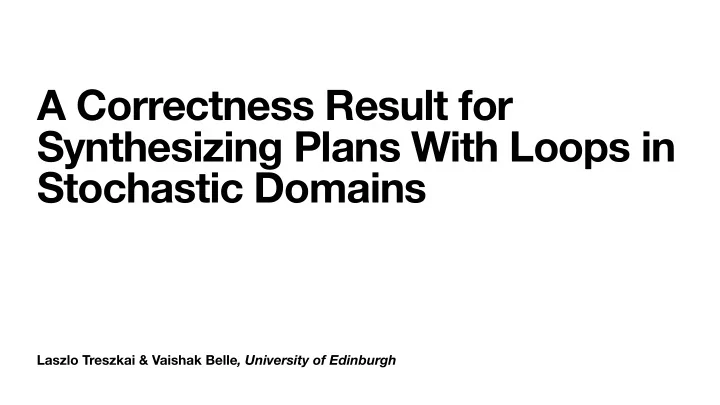

A Correctness Result for Synthesizing Plans With Loops in Stochastic Domains Laszlo Treszkai & Vaishak Belle , University of Edinburgh
Finite State Controllers • FSCs, such as plans with loops, are powerful and compact representations of action selection widely used in robotics, video games and logistics • Cleaning a table (with arbitrary number of objects), chopping tree of unknown thickness • Lots of work on algorithms for synthesis (e.g., AND/OR bounded search, abstraction)
What if the actions are noisy? An agent that stands on the handrail of a bridge: on one side the sidewalk, on the other side the river, and the agent is n steps away is the goal. With every step taken on the handrail, the agent has a 0.1 probability of falling into the river (an absorbing state), and 0.9 probability of moving forward one step. However, can deterministically get onto sidewalk, where forward is also deterministic. Pr = 0.9 n Clearly, moving solely on handrail satisfies goal with . But it can do better.
Pr = 1 Pr = 0.9
How to handle noise? Lots of approaches for FSCs, but many of them are either approximate or do not properly handle non-terminating traces (e.g., assume failure cannot happen infinitely many times) Theorem AND-OR search algorithm fails if at least one history that cannot be extended into a goal history Theorem AND-OR search algorithm fails if at least one looping history
Planning Problem ∑ LGT ≐ Pr( h ) { h ∣ h is a goal history } Given a planning problem , an integer N , LGT* ∈ 𝒬 = ⟨ S , A , O , Δ , Ω , s 0 , G ⟩ (0,1), find a finite-state controller with at most N states such that LGT ≥ LGT* for . (Here, only is stochastic.) 𝒬 Δ
Theorem Given a planning problem , integer N , and LGT* ∈ (0, 1), the 𝒬 search algorithm PANDOR is sound and complete: every FSC 𝒟 returned is N -bounded and LGT ≥ LGT*, and if there exists an N - bounded controller that is LGT ≥ LGT*, then one such FSC will be found
How? Consider the AND-OR algorithm • Initially, the algorithm starts with the empty controller , at initial controller 𝒟 state & q 0 s 0 • AND function enumerates the outcomes of an action from a given combined state and history, and calls OR to synthesize a controller that is correct for every outcome • The OR function enumerates the extensions of a controller for the current controller state and observation, and thus selects a next action for the current observation, and then calls AND to test for correctness recursively on the outcomes of the chosen action •
The extension: key idea • Maintain an upper and lower bound for the LGT of the current controller • Whenever a failing run is encountered, the upper bound is decreased by the likelihood of this run; similarly, a goal run increases the lower bound on LGT • When the lower bound exceeds the desired correctness likelihood (i.e., LGT*), the current controller is guaranteed to be “good enough”, and the algorithm returns with success • When the upper bound is lower than LGT*, none of the extensions of the controller is su ffi ciently good, and we revert the program state to the point of the last non- deterministic choice point • Need to carefully keep track of looping histories (involved)
Pr = 1 Pr = 0.9 github.com/treszkai/pandor
github.com/treszkai/pandor
Conclusions • New theoretical results on a generic technique for synthesizing FSCs in stochastic environments , allowing for highly granular specifications on termination and goal satisfaction • Builds on the generic AND-OR bounded search, a generic technique for deterministic environments • Proved the soundness and completeness of that synthesis algorithm
Recommend
More recommend